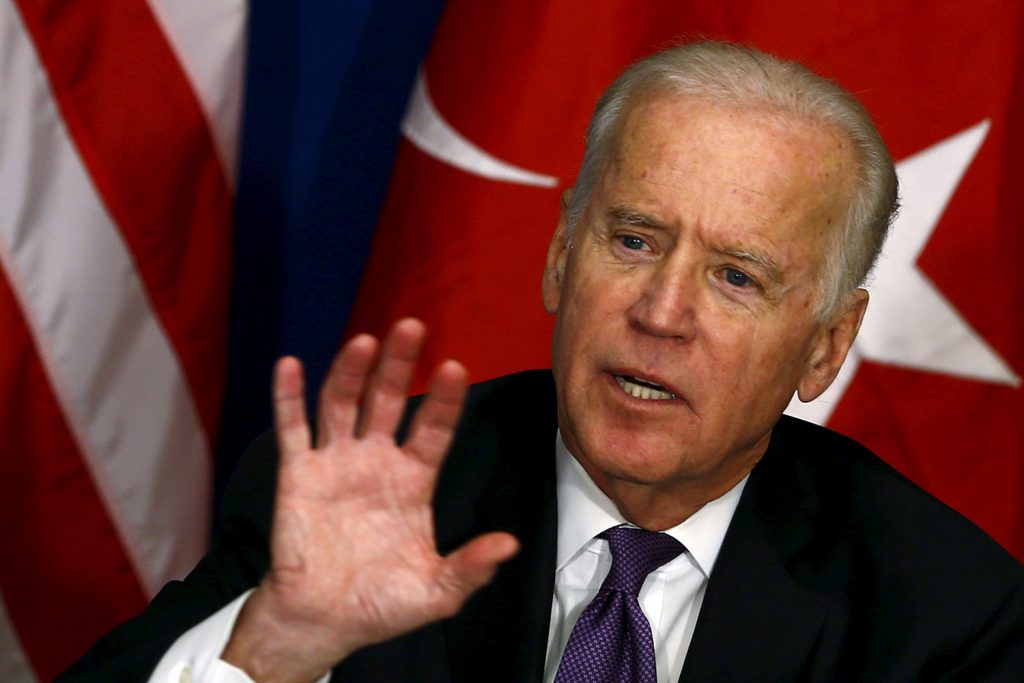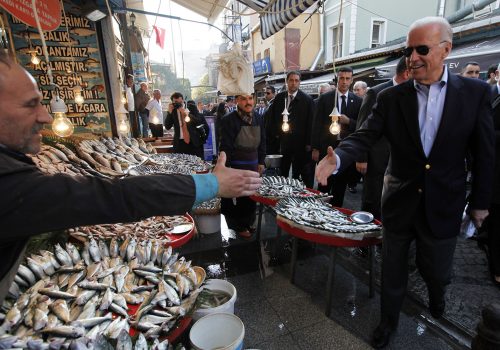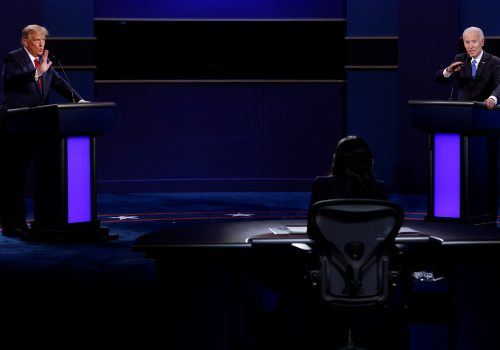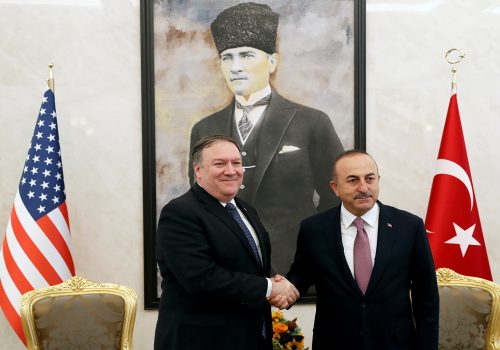It was almost a matter of simple arithmetic that US-Turkey relations would deteriorate with the departure of US President Donald Trump. Subtracting Trump, with his special affinity for Turkish President Recep Tayyip Erdoğan, from the equation would inevitably complicate a difficult bilateral relationship no matter who succeeded him. Joe Biden did not make things easier for himself by dubbing Erdoğan an “autocrat” during the 2020 presidential campaign and calling for his ouster via elections.
Rather than hunkering down for more confrontation, however, Erdoğan has shifted his domestic and foreign policies to open the door for a reset of US-Turkey relations.
Turkey seeks resets with markets and allies
A dramatic restructuring of Turkey’s national leadership occurred on November 8, less than twenty-four hours after US media outlets declared Biden the winner of the US presidential election. Turkish Minister of Finance Berat Albayrak, Erdoğan’s son-in-law, heir apparent, and most powerful minister, resigned. Erdoğan reportedly decided to shift gears after realizing that Albayrak’s unorthodox policy mix of low interest rates and massive purchases of Turkish lira had failed to protect the currency against continued devaluation while depleting the central bank’s foreign-currency reserves. Erdoğan had replaced the governor of the central bank on November 7 with a former finance minister who opposed Albayrak’s policies, apparently triggering Albayrak’s resignation. Markets have welcomed Turkey’s return to more orthodox economic policies. The lira is now the strongest-performing currency among emerging markets after being the weakest one in 2020. Investor confidence is also returning to Turkey.
Ankara’s foreign policy may also be returning to orthodoxy. Following a pugnacious 2020, during which Turkey and its transatlantic allies squared off in disputes stretching from North Africa to the Caspian Sea, Erdoğan now seems to be seeking allied collaboration. He was among the first foreign leaders to congratulate President-elect Biden, noting in his November 10 message that “Turkey-US relations have a strategic quality with a deep-rooted basis…on shared interests and values.” Since early November, Ankara has also been trying to reinvigorate Turkey’s bid for accession to the European Union and to deescalate disputes with Greece in the Eastern Mediterranean over maritime boundaries and exclusive economic zones.
Serious obstacles to a US-Turkey reset: S-400s and PYD/YPG
Still, it is not clear that the Biden administration will be politically able to walk through what Erdoğan sees as Ankara’s open (or opening) door. As a friend who is personally close to the new US president recently told me, the Biden administration would like to restore a sense of strategic partnership with Turkey, but Ankara’s purchase of Russia’s S-400 air-defense system leaves a lingering impression that Turkey is drifting away from the West into Russia’s strategic orbit.
Indeed, Turkey’s agreement to buy S-400s in September 2017 shocked many in Washington. This transaction made Turkey the first NATO member to agree to buy an advanced Russian weapons system after Russia invaded Ukraine and annexed Crimea in 2014. The decision undercut ongoing efforts by the transatlantic community to counter Russian military adventurism in the Baltic and Black Seas, Syria, and Libya. It also placed Turkey in the crosshairs of US sanctions under the Countering America’s Adversaries Through Sanctions Act (CAATSA), which aims to deter purchases of advanced Russian weapons to punish Moscow for its military actions in Ukraine.
Turkey’s S-400 purchase also generated deep concern among top US military commanders that the system’s radars would enable Russia to gather intelligence that could compromise the stealth capabilities of the F-35 Joint Strike Fighter. The F-35 is the world’s most advanced fighter jet; it will be the backbone of US tactical air power for the next two decades. Ankara has dismissed these US fears as posturing.
Unable to resolve this dispute, the US Department of Defense banished Turkey from the F-35 program in July 2019. That dramatic step was met with disbelief and fury in Ankara, given that Turkey had helped fund the plane’s development, planned to buy 100 of the aircraft, and was manufacturing numerous F-35 components.
Meanwhile, in Washington, anger over Turkey’s S-400 purchase was also mounting, especially in Congress. The Trump administration tried to shield Turkey from CAATSA sanctions while searching for a solution that might avoid them altogether. Ultimately, Trump chose to sanction Turkey just before the National Defense Authorization Act (NDAA), which obligated the president to choose five of twelve possible sanctions to impose against Turkey, entered into law in December 2020. The specific penalties Trump selected, however, were among the mildest ones possible.
Trump’s soft approach generated hope that Washington and Ankara might finally put their S-400 row behind them. On February 8, Minister of Defense Hulusi Akar proposed that Turkey and the United States negotiate a package solution that would address both the US’s worry about the S-400’s intelligence-gathering capabilities and Turkey’s concern about the US’s partnership in Syria with the PYD/YPG, a group viewed across Turkey’s political spectrum as the Syrian branch of the terrorist group PKK.
The Biden administration politely but immediately rejected Turkey’s offer, reflecting how deeply Turkey’s S-400 purchase had shaken Washington. Indeed, as Secretary of State Antony Blinken noted during his Senate confirmation hearing, “The idea that a strategic—so-called strategic—partner of ours would actually be in line with one of our biggest strategic competitors in Russia is not acceptable.” Blinken added: “I think we need to take a look to see the impact that the existing sanctions have had and then determine whether [there is] more that needs to be done.”
Even if Biden wanted to negotiate, however, he would face significant legal and political limitations. Frustrated by Trump’s stonewalling, Congress mandated in the NDAA that the US president cannot lift CAATSA sanctions until one year after the law enters into force, and then only if Turkey “is no longer in possession of” its S-400s. Relinquishing the S-400s, however, is unthinkable in Turkey’s current political climate. Erdoğan’s ruling Justice and Development Party (AKP) relies heavily on its alliance with the hardline Nationalist Action Party (MHP), which insists that Turkey stand up to US pressure in general and especially on the matter of S-400s. Notwithstanding Ankara’s new desire to resolve the S-400 dispute via negotiations, it seems Turkey and the United States remain at an impasse.
The same is true with regard to Syria. Washington seems to be doubling down on its partnership with the PYD/YPG. Biden has appointed Brett McGurk as his White House coordinator for the Middle East and North Africa on the National Security Council staff. McGurk, who served as the presidential envoy for the US campaign against the Islamic State in Iraq and Syria (ISIS) in both the Obama and Trump administrations, is viewed by Ankara as the architect of the US partnership with the PYD/YPG, a policy seen throughout Turkey as choosing one terror group to fight another. He resigned in December 2018 in protest of then-President Trump’s decision to withdraw US troops and acquiesce to Turkey’s military operation to establish a YPG-free “safe zone” in northern Syria.
Park the toughest issues to make progress elsewhere
Washington and Ankara are thus locked in a dialogue of the deaf on both S-400s and the PYD/YPG. But if they can sideline these thorny disputes for now, they may be able to generate progress on other issues and then potentially return to the more intractable problems in a cooperative mood.
One of these issues could be the Eastern Mediterranean. Tensions soared there this past summer over legal disputes between Turkey and Greece about exclusive economic zones (EEZs) and hydrocarbon exploration. The pressure peaked in August, when France sent fighter jets to Crete, and warships from Greece and Turkey collided. Subsequently, however, German Chancellor Angela Merkel mediated talks between Ankara and Athens, counterbalancing French President Emmanuel Macron’s push to punish Turkey, while NATO brokered efforts to prevent military accidents between the two allies. These efforts led Turkey to take a major deescalatory step, announcing on November 30 that its national oil company, TPAO, would return its exploration ships to port from waters also claimed by Greece and the Republic of Cyprus as part of their EEZs. The European Council reciprocated on December 10 by postponing further sanctions against Turkey until it could confer with the incoming Biden administration.
This diplomatic give-and-take cleared the way for Greece and Turkey to resume “exploratory talks,” which had been dormant since 2016, on January 25. Though details about the discussions are scant, a preliminary compromise could be possible. This could involve Greece agreeing to drop the EEZ it claims for its tiny island of Kestellorizo (or Meis in Turkish) just off Turkey’s Anatolian coast, which dramatically limits Turkey’s EEZ; in exchange, Turkey could agree that large islands like Crete and Rhodes can be entitled to “reasonable” EEZs on a case-by-case basis. Ankara could then bolster positive momentum by keeping TPAO’s exploration ships outside Greece’s previously claimed EEZ for Kastellorizo for an agreed period.
A second potential area for US-Turkey cooperation is Ukraine’s security. Turkey and Ukraine are developing a defense partnership that can help NATO counterbalance Russia’s menacing posture in the Black Sea region. In December 2020, Ukraine and Turkey agreed to co-produce Turkish-engineered armed drones and that Ukraine’s navy would procure Turkish stealth corvettes. This understanding built on their military framework and defense-industry agreements from October 2020, after which Erdoğan declared: “Turkey sees Ukraine as a key country for the establishment [of] stability, security, peace and prosperity in the region.” Erdoğan’s statement tracked with Blinken’s remarks three months later at his Senate confirmation hearing, when he pledged that the Biden administration will “continue to support the arming and training of Ukraine’s military, the continued provision to Ukraine of lethal defensive assistance, and indeed of the training program as well.”
Third, the Biden administration could come to appreciate Turkey’s innovative drone technologies and tactics, which fought Russian military forces to a standstill in northwest Syria last March and in Libya last June, as a valuable new NATO asset in themselves.
Fourth, the United States and Turkey could collaborate to restore stability and prosperity following the Second Nagorno-Karabakh War last autumn. Although then-candidate Biden criticized Turkey for supporting Azerbaijan in its forty-four-day war with Armenia, he also warned Armenia that “regions surrounding Nagorno-Karabakh cannot be occupied indefinitely.” More recently, US National Security Advisor Jake Sullivan reportedly discussed Nagorno-Karabakh in a February 2 phone call with the Turkish president’s spokesperson and chief advisor, Ibrahim Kalin.
Turkey’s new military presence in Azerbaijan, where it now runs a peacekeeping center jointly with Russia, provides NATO eyes and ears to observe Russia’s relatively large peacekeeping operation there. This Turkey-NATO presence could help deter Russian peacekeepers from engaging in the kind of destabilizing behavior that they have in Moldova’s breakaway region of Transnistria and Georgia’s separatist regions of South Ossetia and Abkhazia.
Turkey could also help reintegrate Armenia into the regional economy. The November 9/10 ceasefire statement among Armenia, Azerbaijan, and Turkey ending the Second Nagorno-Karabakh War stipulates, “All economic and transport links in the region are unblocked.” This includes linkages between Armenia and Turkey, which were nearly reestablished in 2009. Turkey is consequently planning a new rail line and a natural-gas pipeline into Azerbaijan’s exclave of Nakhchivan, which could be extended into Armenia. That pipeline could provide natural gas as a feedstock for a petrochemical industrial zone that could be located jointly on the territories of Turkey, Armenia, and Azerbaijan. Although Armenia’s current post-war political crisis makes such trilateral projects inconceivable for now, an effort like this could eventually help heal the wounds of war and generate jobs and growth through regional cooperation.
Finally, a joint effort to increase bilateral trade and US investment in Turkey could yield a range of economic and security benefits, in part by providing tangible incentives for responsible economic leadership in Ankara. The energy sector, especially the further diversification of Turkey’s natural-gas supplies away from Russia and Iran, could be particularly promising. US liquefied natural gas (LNG) sales to Turkey increased by 144 percent during the first half of 2020 and can continue to grow. The Biden administration could also work with Ankara to move natural gas northward into the eastern Balkans and Ukraine, thereby bolstering those countries’ energy independence from Russia.
It may be difficult to recognize these opportunities in Washington, where Turkey is currently seen less as a partner in managing problems than as a problem to manage. The same is true in Ankara, which expects Washington to automatically accept Turkey’s sudden invitation to deescalate tensions. But both countries, and all of NATO, now have a chance to secure strategic gains in regions surrounding Turkey if they can avoid obsessing over intractable disputes. Blinken, in fact, recently called for Turkey to host talks between the government of Afghanistan and the Taliban. It’s a sign that US-Turkey relations may indeed be moving toward a more pragmatic footing.
Matthew Bryza is a senior fellow with the Atlantic Council’s Global Energy Center, Eurasia Center, and Atlantic Council IN TURKEY program. He served as a US diplomat for over two decades, including as US ambassador to Azerbaijan, deputy assistant secretary of state for European and Eurasian affairs, and director for Europe and Eurasia on the National Security Council staff. He is also the CEO of Lamor Turkey, a Finnish-Turkish joint venture providing environmental solutions, and a board member of Turcas Petrol, a publicly-traded Turkish energy company invested in gasoline stations (with Shell), electricity generation (with RWE), and geothermal power.
The views expressed in TURKEYSource are solely those of the authors and do not necessarily reflect the views of the Atlantic Council, its staff, or its supporters.
Further reading
Image: U.S. Vice President Joe Biden gestures as he meets with representatives of civil society in Istanbul, Turkey, January 22, 2016. REUTERS/Murad Sezer



